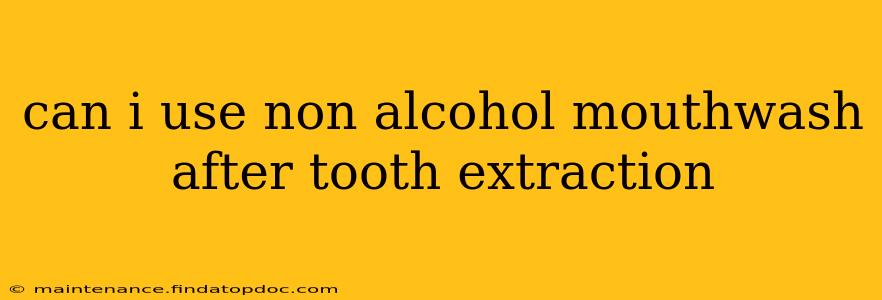Can I Use Non-Alcohol Mouthwash After Tooth Extraction?
Following a tooth extraction, maintaining excellent oral hygiene is crucial for a smooth recovery. Many people wonder about the use of mouthwash, particularly non-alcoholic varieties, during this healing period. The short answer is: generally, yes, but with caution and under the guidance of your dentist or oral surgeon.
While non-alcohol mouthwash can help keep your mouth clean and reduce the risk of infection, its use after extraction needs careful consideration. The key is understanding why alcohol-based mouthwashes are generally discouraged and which alternatives might be suitable.
Why Avoid Alcohol-Based Mouthwash After Tooth Extraction?
Alcohol can irritate the sensitive extraction site, potentially slowing down the healing process and even causing pain. The alcohol's drying effect can also interfere with clot formation, increasing the risk of a dreaded dry socket – a painful complication where the blood clot is dislodged.
What Type of Non-Alcohol Mouthwash is Best After Tooth Extraction?
The ideal non-alcohol mouthwash after a tooth extraction is one that's:
- Gentle: Avoid anything harsh or abrasive that could further irritate the extraction site.
- Antiseptic: Look for ingredients like chlorhexidine or cetylpyridinium chloride (CPC), which have antibacterial properties to help prevent infection.
- Alcohol-Free: This is crucial to avoid the aforementioned irritation and complications.
Your dentist or oral surgeon will likely recommend a specific mouthwash, or suggest a brand and concentration suitable for your needs. Always follow their advice diligently.
How to Use Non-Alcohol Mouthwash After Tooth Extraction?
Even with a gentle, non-alcoholic mouthwash, proper technique is important:
- Gentle Rinsing: Avoid forceful rinsing or swishing that could dislodge the blood clot. Gently rinse the mouth with small amounts of the mouthwash, avoiding direct contact with the extraction site as much as possible.
- Frequency: Follow your dentist's instructions on how often to rinse. It's usually recommended to rinse several times a day, but not excessively.
- Timing: Avoid rinsing immediately after the extraction. Wait until the bleeding has stopped, typically a few hours after the procedure.
What if I Don't Have a Recommended Mouthwash?
If you don't have a specific recommendation from your dentist, and need something immediately, a simple saline rinse (salt water) can be a good temporary alternative. Dissolve a half-teaspoon of salt in a glass of warm water and gently rinse your mouth. This helps clean the area and can reduce swelling.
What Are the Risks of Using the Wrong Mouthwash After Tooth Extraction?
Using an inappropriate mouthwash after a tooth extraction can increase the risk of:
- Dry Socket: As mentioned, the alcohol in some mouthwashes can disrupt clot formation.
- Infection: While mouthwash helps prevent infection, using one that's too harsh or not suited for the healing process can inadvertently increase the risk.
- Irritation: Harsh ingredients can prolong pain and discomfort.
When Should I See My Dentist?
Contact your dentist or oral surgeon immediately if you experience any of the following:
- Excessive bleeding: More than minor oozing.
- Increased pain: Pain that doesn't improve or worsens significantly.
- Signs of infection: Swelling, redness, pus, or fever.
- Dry socket: Severe pain in the extraction site, often accompanied by a bad taste or odor.
Remember, proper post-extraction care is essential for a successful recovery. Always consult with your dentist or oral surgeon for personalized advice on using mouthwash and other aspects of your post-operative care. They can provide the best guidance tailored to your specific situation.
